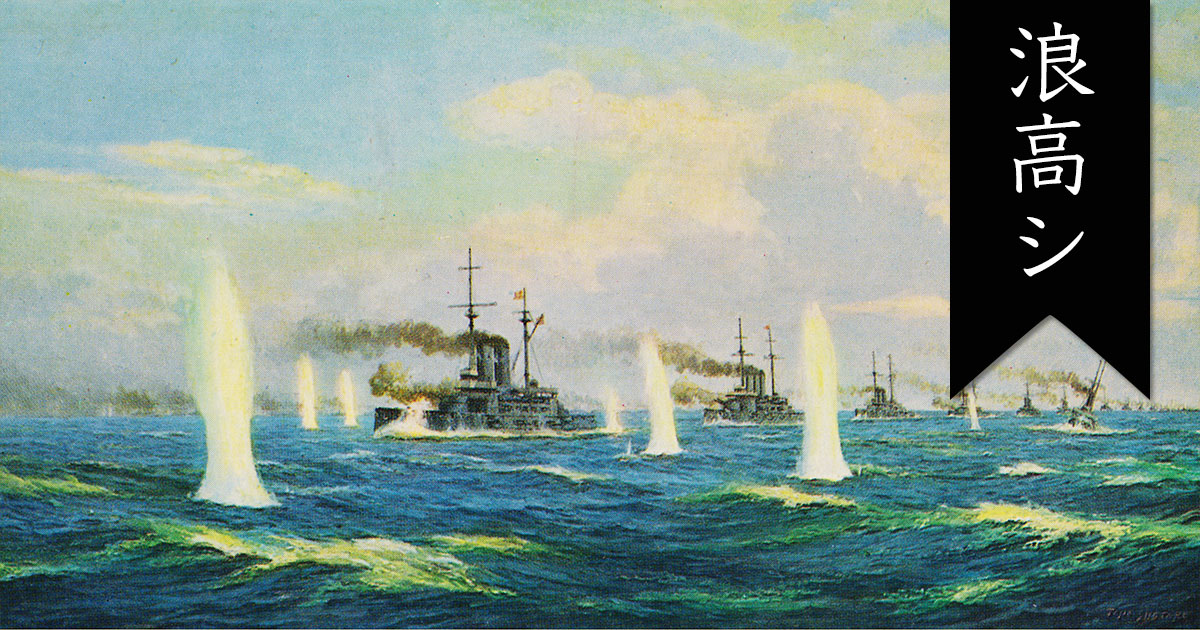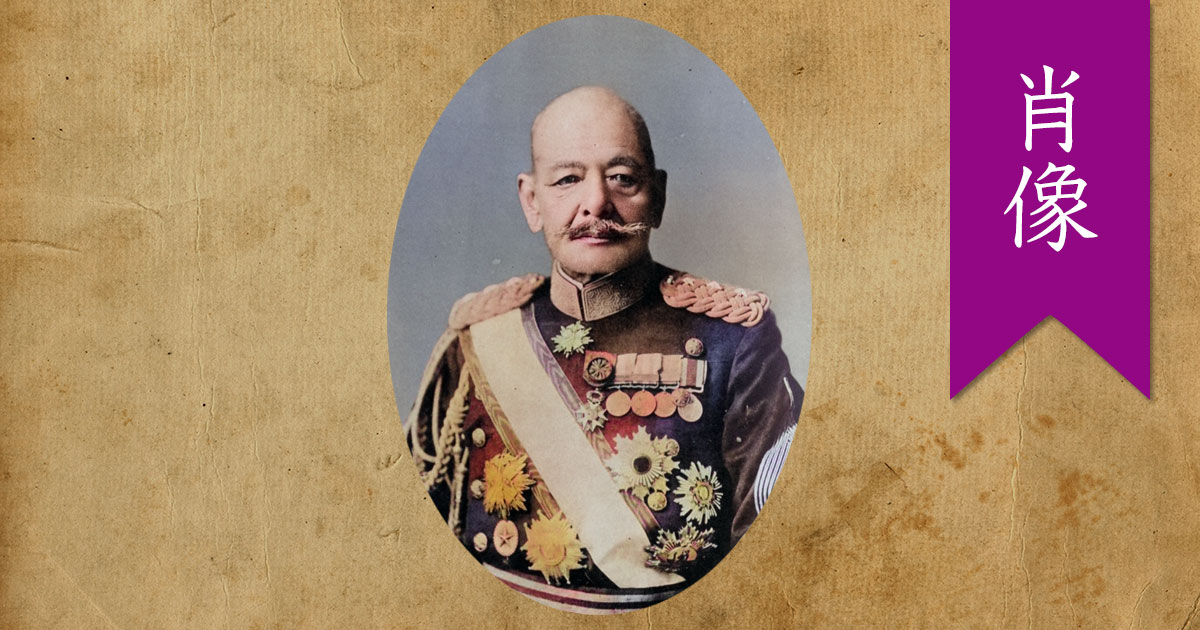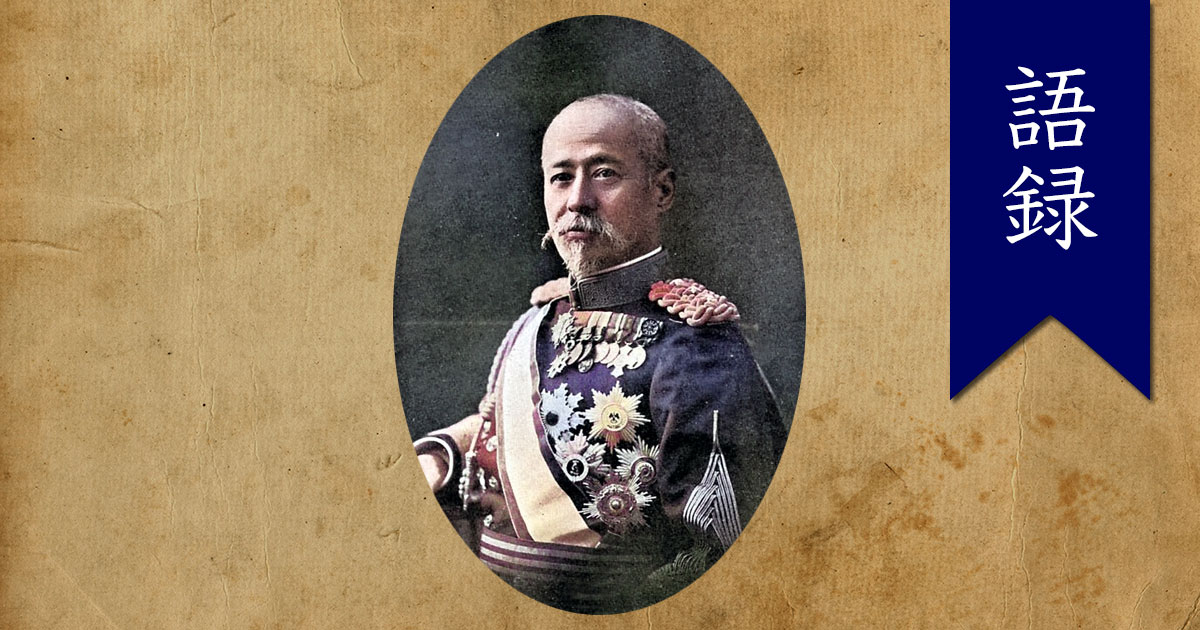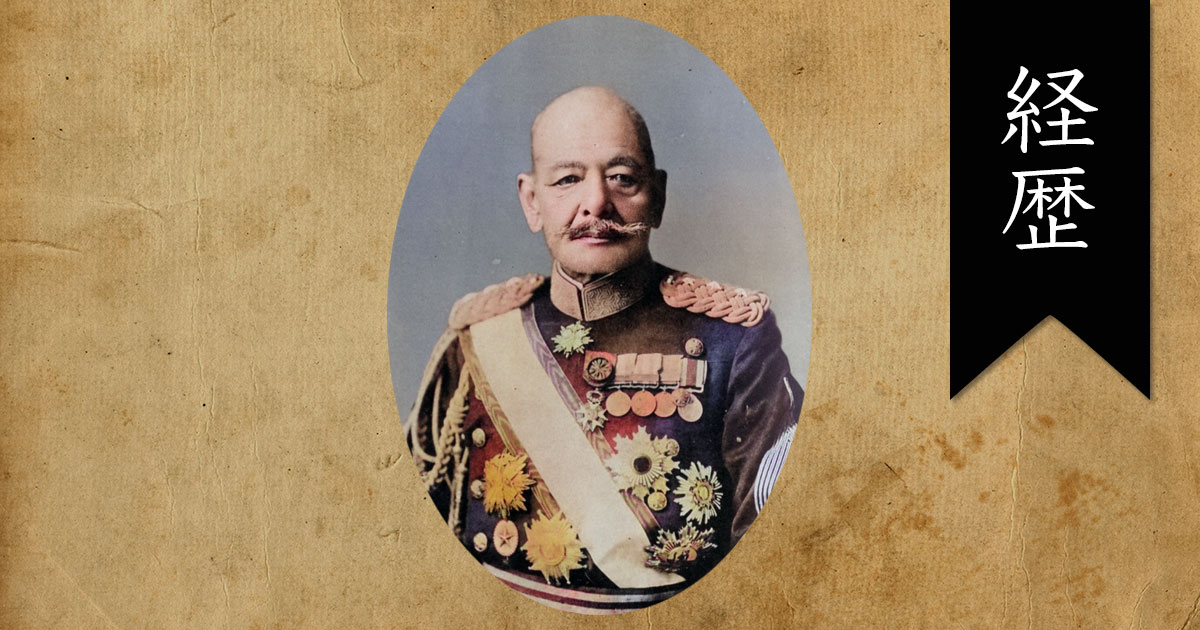聯合艦隊解散之辞(連合艦隊解散の辞)の原文を現代語訳、英訳で
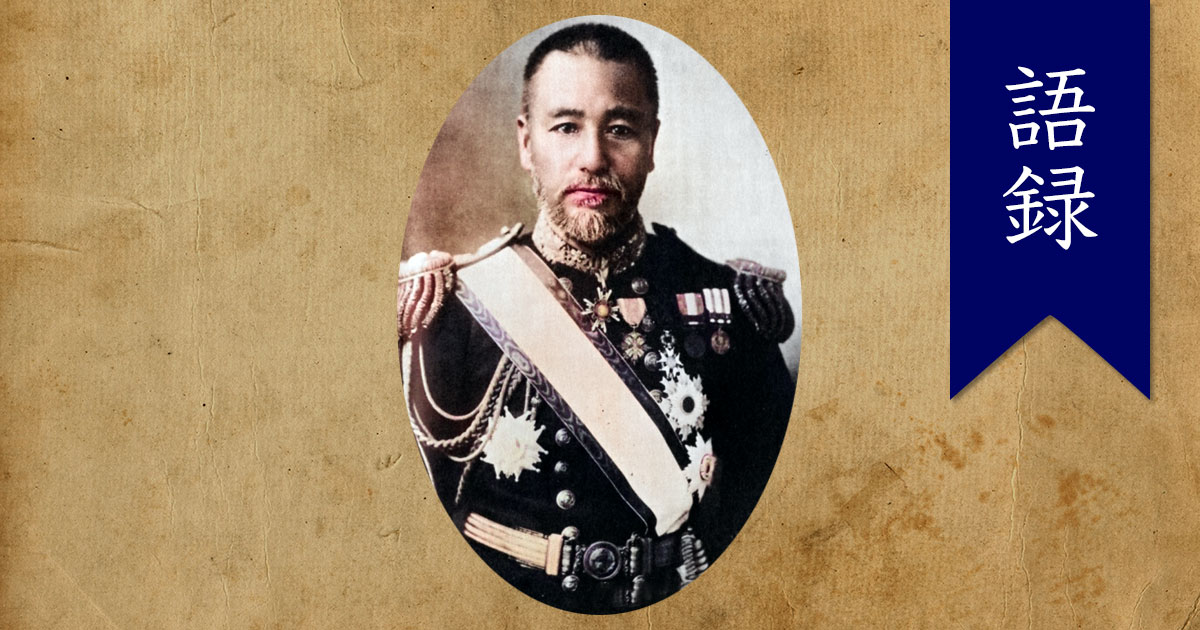
1903年(明治36年)12月28日に、日本とロシアの開戦に備えて編成された連合艦隊は、1905年(明治38年)5月の日本海海戦において華々しい勝利をあげ、戦いは終結した。
同年12月20日、連合艦隊はその戦時編成を解散し、東郷平八郎連合艦隊司令長官は翌21日、解散式を行い、下述の所信を述べて告別の辞とした。※起草は参謀秋山真之によると言われる。
1. 原文
二十閲月の征戦已に往時と過ぎ、我が連合艦隊は今や其の隊務を結了して茲に解散する事となれり。 然れども我等海軍軍人の責務は決して之が為めに軽減せるものにあらず。此の戦役の収果を永遠に全くし、 尚益々国運の隆昌を扶持せんには、時の平戦を問はず、先づ外衝に立つべき海軍が常に其の武力を海洋に保全し、一朝緩急に応ずるの覚悟あるを要す。
而して武力なるものは艦船兵器等のみにあらずして、之を活用する無形の実力にあり。 百発百中の一砲能く百発一中の敵砲百門に対抗し得るを覚らば、我等軍人は主として武力を形而上に求めざるべからず。 近く我が海軍の勝利を得たる所以も、至尊の霊徳に頼る所多しと雖も、抑亦平素の練磨其の因を成し、 果を戦役に結びたるものして、若し既往を以て将来を推すときは、征戦息むと雖も安じて休憩す可らざるものあるを覚ゆ。
惟ふに武人の一生は連綿不断の戦争にして、時の平戦に由り其の責務に軽重あるの理無し。事有れば武力を発揮し、 事無ければ之を修養し、終始一貫其の本分を尽さんのみ。過去の一年有半、彼の風濤と戦ひ、寒暑に抗し、屡頑敵と対して生死の間に出入せしこと固より容易の業ならざりしも、観ずれば是れ亦長期の一大演習にして、 之に参加し幾多啓発するを得たる武人の幸福比するに物無し、豈之を征戦の労苦とするに足らんや。苟も武人にして治平に偸安せんか、兵備の外観巍然たるも宛も沙上の楼閣の如く暴風一過忽ち崩倒するに至らん、洵に戒むべきなり。
昔者神功皇后三韓を征服し給ひし以来、韓国は四百余年間我が統理の下にありしも、一たび海軍の廃頽するや忽ち之を失ひ、 又近世に入り徳川幕府治平に狃れて兵備を懈れば、挙国米艦数隻の応対に苦み、露艦亦千島樺太を覦覬するも之と抗争すること能はざるに至れり。 翻て之を西史に見るに、十九世紀の初めに当り、ナイル及トラファルガー等に勝ちたる英国海軍は、祖国を泰山の安きに置きたるのみならず、 爾来後進相襲で能く其の武力を保有し、世運の進歩に後れざりしかば、今に至る迄永く其の国利を擁護し、国権を伸張するを得たり。
蓋し此の如き古今東西の殷鑑は為政の然らしむるものありしと雖も、主として武人が治に居て乱を忘れざると否とに基ける自然の結果たらざるは無し。
我等戦後の軍人は深く此等の實例に鑒み、既有の練磨に加ふるに戦役の実験を以てし、更に将来の進歩を図りて時勢の発展に後れざるを期せざる可らず。 若し夫れ常に、聖諭を奉體して孜々奮励し、実力の満を持して放つべき時節を待たば、庶幾くば以て永遠に護国の大任を全うすることを得ん。
神明は唯平素の鍛練に力め、戦はずして既に勝てる者に勝利の栄冠を授くると同時に、一勝に満足して治平に安ずる者より直に之を褫ふ。
古人曰く勝て兜の緒を締めよと。
明治38年12月21日 連合艦隊司令長官 東郷平八郎
2. 現代語訳
二十数ヶ月にわたった戦いも、はや過去のこととなり、わが連合艦隊は、今やその任務を果して、ここに解散することとなった。しかし艦隊は解散しても、そのためにわが海軍軍人の務めや責任が、軽減するということは、決してない。この戦役で収めた成果を、永遠に生かし、さらに一層国運をさかんにするには、平時戦時の別なく、まずもって外の守りに対し、重要な役目を持つ海軍が、常に万全の海上戦力を保持し、ひとたび事あるときは、ただちに、その危急に対応できる構えが必要である。
ところで、その戦力であるが、戦力なるものはただ艦船兵器等有形の物や数によってだけ、定まるのではなく、これを活用する能力すなわち無形の実力にも実在する。百発百中の砲は、一門よく百発一中、いうなれば百発打っても一発しか当らないような砲なら百門と対抗することができるのであって、この理に気づくなら、われわれ軍人は無形の実力の充実、即ち訓練に主点を置かなければならない。先般わが海軍が勝利を得たのは、もちろん天皇陛下の霊徳によるとはいえ、一面また将兵の平素の練磨によるものであって、それがあのような事例をもって、将来を推測するならば、たとえ戦いは終ったとはいえ、安閑としてはおれないような気がする。
考えるに武人の一生は戦いの連続であって、その責務は平時であれ、戦時であれ、その時々によって軽くなったり、重くなったりするものではない。事が起これば、戦力を発揮するし、事がないときは、戦力の涵養につとめ、ひたすらその本分を尽くすことにある。過去一年半かの風波と戦い、寒暑を冒し、しばしば強敵とまみえて生死の間に出入りしたことは、もちろんたいへんなことではあったが、考えてみると、これもまた、長期の一大演習であって、これに参加し、多くの知識を啓発することができたのは、武人として、この上もない幸せであったというべく、なんで戦争で苦労したなどど、いえたものであろう。もし武人が太平に安心して、目前の安楽を追うならば、兵備の外見がいかにりっぱであっても、それはあたかも、砂上の楼閣のようなものでしかなく、ひとたび暴風にあえば、たちまち崩壊してしまうであろう。まことに心すべきことである。
むかし神功皇后が三韓を征服されて後、韓国は四百余年間、わが支配の下にあったけれども、一たび海軍がすたれると、たちまちこれを失い、また近世に至っては、徳川幕府が太平になれ、兵備をおこたると、数隻の米艦の扱いにも国中が苦しみ、またロシアの軍艦が千島樺太をねらっても、これに立ち向うことができなかった。目を転じて西洋史を見ると、十九世紀の初期ナイル及びトラファルガー等に勝った英国海軍は、祖国をゆるぎない案泰なものとしたばかりでなく、それ以後、後進が相次いで、よくその武力を維持し、世運の進歩におくれなかったから、今日に至るまで永く国益を守り、国威を伸張することができた。
考えるに、このような古今東西のいましめは、政治のあり方にもよるけれども、そもそもは武人が平安な時にあっても、戦いを忘れないで、備えを固くしているか、どうかにかかり、それが自然にこのような結果を生んだのである。
われ等戦後の軍人は、深くこれ等の実例を省察し、これまでの練磨の上に、戦役の体験を加え、さらに将来の進歩を図って、時勢の発展におくれないように努めなければならない。そして常に聖諭を泰戴して、ひたすら奮励し、万全の実力を充実して、時節の到来を待つならば、おそらく、永遠に護国の大任全うすることができるであろう。
神は平素ひたすら鍛錬につとめ、戦う前に既に戦勝を約束された者に、勝利の栄冠を授けると共に、一勝に満足し、太平に安閑としている者からは、ただちにその栄冠を取上げてしまうであろう。
昔のことわざにも「勝って兜の緒を締めよ」とある。
出典:「東郷神社資料室」より
3. 要約すると
戦争が終わったとは言え、連合艦隊の解散は軍人の責任を減少させるものではない。海軍の戦力は物理的な装備だけではなく、実際の能力、すなわち訓練や経験にも基づく。事実、先日の勝利は良好な訓練と持続的な努力の成果だった。武人の人生は戦いの連続であり、平時でも戦時でもその使命は変わらない。歴史を振り返ると、充分な備えがない国はすぐに力を失うが、常に備えを整えている国は長く繁栄する。われわれは過去の教訓から学び、未来に備える必要がある。神は努力と準備のある者に勝利を授け、満足している者からはその栄光を取り上げる。勝利後も油断せず、常に準備を怠らないよう心がけるべきである。
4. 英訳
東郷司令長官のこの訓示は、たちまち各国語に翻訳され、世界中に紹介された。中でもアメリカ合衆国のセオドア・ルーズベルト大統領は、これを一読し、大いに感動した。直ちに筆を取って陸海軍長官に書簡を綴り、これを部下の陸海軍人に教示するよう促した。以下は、その書簡の中に見られる「連合艦隊解散の辞」を英訳したものである。
“The war of twenty months’ duration is now a thing of the past, and our United Squadron, having completed its function, is to be herewith dispersed. But our duties as naval men are not at all lightened for that reason. To preserve in perpetuity the fruits of this war; to promote to an ever greater height of prosperity the fortunes of the country, the navy, which, irrespective of peace or war, has to stand between the Empire and shock from abroad, must always maintain its strength at sea and must be prepared to meet emergency.
This strength does not consist solely in ships and armament; it consist also in immaterial ability to utilize such agents. When we understand that one gun which scores a hundred per cent. of hits is a match for a hundred of the enemy’s guns each of which scores only one per cent. it becomes evident that we sailors must have recourse before everything to the strength which is over and above externals. The triumphs recently won by our Navy are largely to be attributed to the habitual training which enable us to garner the fruits of the fighting.
If then we infer the future from the past, we recognize that though war may ceases we can not abandon ourselves to ease and rest. A soldier’s whole life is one continuous and unseasing battle, and there is no reason why his responsibilities should vary with the state of the times. In days of crisis he has to display his strength; in days of peace to accumulate it, thus perpetually and uniquely discharging his duties to the full. It was no light task that during the past year and a half we fought with wind and waves, encountered heat and cold, and kept the sea while frequently engaging a stubborn enemy in a death or life struggle; yet, when we reflect, this is seen to have been only one in a long series of general maneuvers, wherein we had the happiness to make some discoveries; happiness which throws into comparative insignificance the hardships of war.
If men calling themselves sailors grasp at the pleasure of peace, they will learn the lesson that however fine in appearance their engines of war, these, like a house built on the sand, will fall at the first approach of the storm. From the day when in ancient times we conquered Korea, that country remained for over 400 years under our control, to be lost immediately as soon as our navy declined. Again when under the sway of the Tokugawa in modern days our armaments were neglected, the coming of a few American ships threw us into distress, and we were unable to offer any resistance to attempts against the Kuriles and Saghalien.
On the other hand, if we turn to the annals of the Occident, we see that at the beginning of the 19th century the British Navy which won the battles of the Nile and of Trafalgar, not only made England as secure as a great mountain but also by thenceforth carefully maintaining its strength and keeping it on a level with the world’s progress, has throughout the long interval between that era and the present day safe-guarded the country’s interests and promoted its fortunes.
For such lessons, whether ancient or modern, Occidental or Oriental, though to some extent they are the outcome of political happenings, must be regarded as in the main the natural result of whether the soldier remembers war in the day of peace. We naval men who have survived the war must take these examples deeply to heart, and adding to the training which we have already received our actual experiences in the war, must plan future developments and seek not to fall behind the progress of the time.
If, keeping the instructions of our Sovereign ever graven on our hearts, we serve earnestly and diligently, and putting forth our full strength, await what the hour may bring forth, we shall then have discharged our great duty of perpetually guarding our country. Heaven gives the crown of victory to those only who by habitual preparation win without fighting, and at the same time forthwith deprives of that crown those who, content with one success, give themselves up to the ease of peace. The ancients well said:
“Tighten your helmet strings in the hour of victory.”
(Dated) 21st December, 1905.
TOGO HEIHACHIRO.
I commend the above address to every man who is or may be a part of the fighting force of the United States, and to every man who believes that, if ever, unhappily war should come, it should be so conducted as to reflect credit upon the American nation.
「余は以上の訓示を合衆国の軍隊の一員たる者ならびに、もし万一不幸にして戦いが生じた時、祖国の名誉を護るために身を捧げんとする人たちに推薦する。」
THEODORE ROOSEVELT.
CHARIES J. BONAPARTE,
Secretary.
(セオドア・ルーズベルト大統領「書簡」より)




